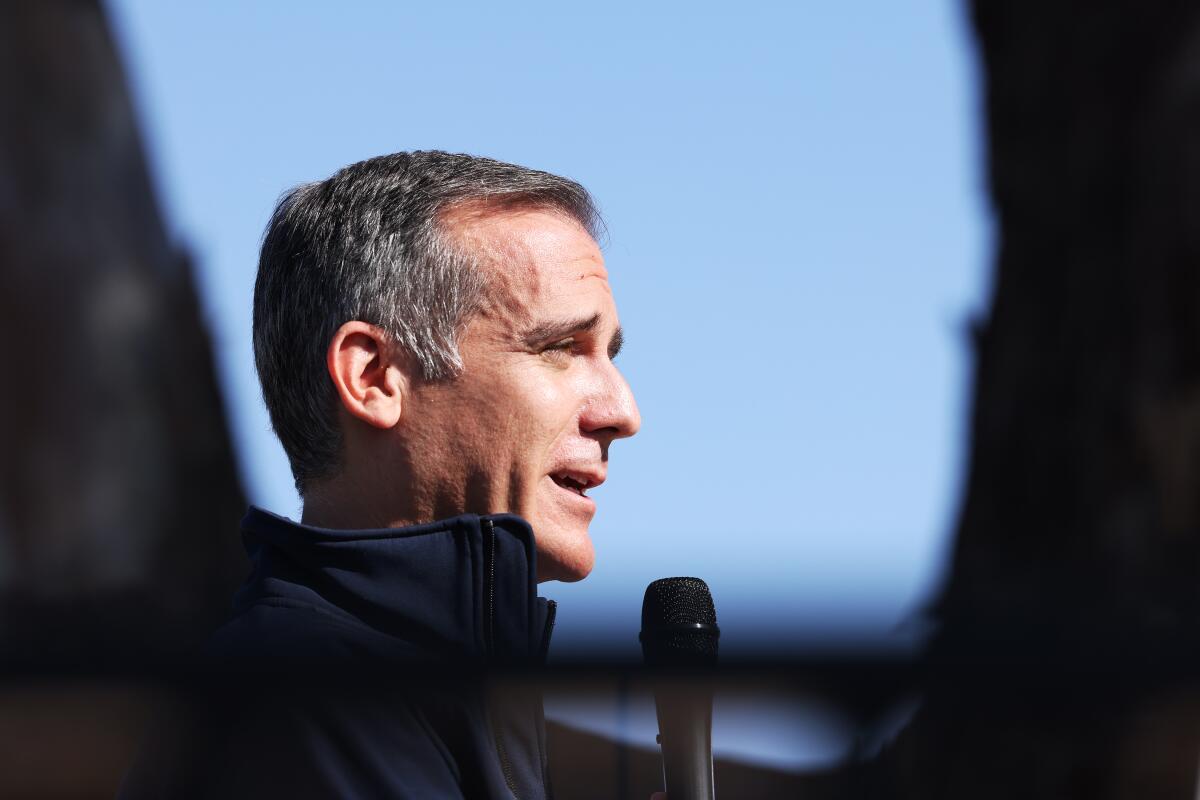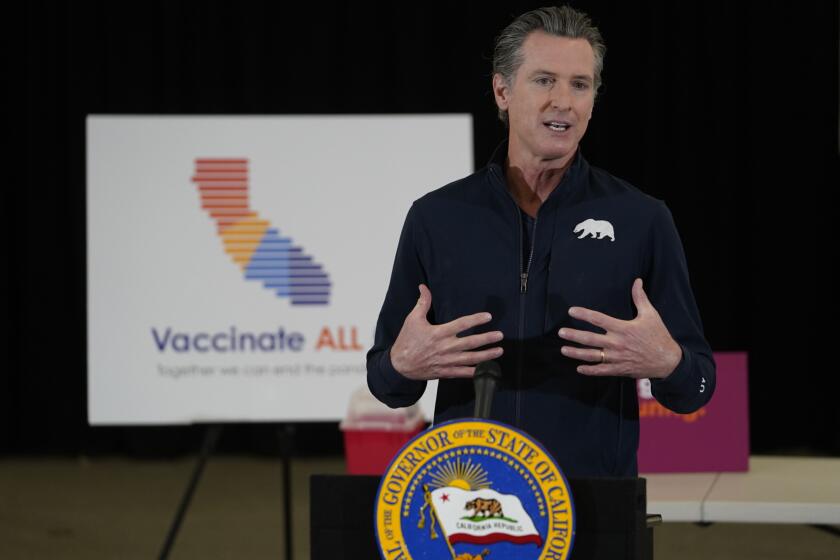Donors gave millions to Garcetti nonprofit but kept their identities secret, Times analysis finds

After Los Angeles Mayor Eric Garcetti took office in 2013, he helped launch a charity fund that allows donors to support diverse programs from environmental initiatives to youth employment.
Since then, Garcetti has reported raising more than $60 million from corporations, foundations, and individuals for the nonprofit Mayor’s Fund for Los Angeles. A Times data analysis found that at least $3.8 million of that total came from contributors who gave through accounts that mask their identity, a practice that alarms ethics watchdogs who say such donations skirt a state law intended to make those donors’ names public.
These contributors used donor-advised funds, a type of charitable giving account offered by some nonprofit foundations and for-profit investment firms that provide a generous tax deduction and, when requested, anonymity.
Donor-advised funds have existed for decades and become popular in recent years among individuals and companies wanting to make charitable gifts. Their use for donations sought by elected officials in California was first reported last month by The Times.
California law requires that charitable donations of $5,000 or more requested by elected officials or their representatives — money known as behested payments — be reported to the state. However, donor-advised funds allow contributors to shield their names or organizations when making charitable contributions on behalf of a politician, which critics say undermines transparency laws meant to limit undue influence in government.
In required filings with the city’s Ethics Commission, Garcetti’s office reported that a $3-million donation requested by the mayor came into the Mayor’s Fund in December. An undisclosed account holder made the gift through a donor-advised fund overseen by Bessemer Trust, a wealth management firm.
The little-known practice of routing behested payments through donor-advised funds allows those who make charitable contributions on behalf of elected officials to obscure their identities in state records.
Garcetti spokesman Alex Comisar declined to reveal the individual or company behind the $3-million donation or other donations sought by Garcetti totaling about $1 million that have been given through donor-advised funds since 2014.
“Our office follows the applicable rules and guidance in reporting behested contributions and donor information,” Comisar said.
A Bessemer Trust spokeswoman declined comment.
The Times reported last month that Gov. Gavin Newsom sought a $1-million contribution last year for a pandemic relief program supporting undocumented immigrants, with the gift routed through a donor-advised fund. Newsom’s office declined to reveal who was behind the gift.
Open-government groups say charitable gifts made on behalf of elected officials may go to worthy causes, but it remains critical to identify where the gifts come from to ensure the public knows the donor’s background. In some cases, companies that donate at the request of elected officials have business before the state or local governments, such as multimillion-dollar contracts or regulatory decisions.
The way contributions from donor-advised funds are now reported, critics argue, is akin to the name of a banking institution being released, not the name of the person who wrote the check.
“It is clearly inadequate,” said Jonathan Mehta Stein, executive director of watchdog group California Common Cause.
State law does not address the use of donor-advised funds when politicians seek charitable donations, but, as a general rule, the true source of donations is supposed to be disclosed, according to the Fair Political Practices Commission.
“If it is legal under current FPPC regulations, it should be addressed immediately,” Stein said. “The law should ensure transparency around donor-advised funds.”
The charitable giving mechanism has come under fire for lacking oversight, as donors can let the assets accrue indefinitely. A person deposits money in an account with a nonprofit foundation, receives an immediate tax write-off for those assets, and then directs to charitable causes at their own pace over years or decades.
The extent to which donor-advised funds have been used to make behested payments for elected officials in the state is unclear. Filings required by the state do not indicate when a donor-advised fund is used.
The Times identified $3.8 million given to the Mayor’s Fund on behalf of Garcetti from donor-advised funds where the identity of the person or company was withheld.
Launched in 2014, the Mayor’s Fund has operated out of City Hall and works with city employees on programs. The nonprofit has a small staff and a board of directors.
Asked to comment for the story, Mayor’s Fund Chief Executive Deidre Lind said, “The focus here should be on the 255,000 Angelenos — and counting — who have received a vaccination, funds to put food on the table or keep a business open, and access to remote learning, thanks to the more than 12,500 generous donors to the Mayor’s Fund.”
Filings by Garcetti’s office with the Ethics Commission show an inconsistent practice of identifying the source of a contribution given through a donor-advised fund.
For example, a $5,000 donation from the Thomas and Jessica Rothman Charitable Fund from a donor-advised fund at Schwab Charitable in April 2020 made clear who was directing the money into the Mayor’s Fund.
However, that wasn’t the case last June, when a $455,000 donation was made through the Silicon Valley Community Foundation to the Mayor’s Fund, according to a filing made by Garcetti’s office. That money was from a donor-advised fund along with two others — $300,000 in 2019 and $100,000 in 2018, said foundation spokeswoman Chau Vuong.
Like other foundations, Silicon Valley Community Foundation does not identify account holders.
The $1-million donation given at Newsom’s behest last year also came through the Silicon Valley Community Foundation.
State records show that so-called “behested payments” spiked in 2020 compared to the year prior, when companies gifted $12.1 million on Gov. Newsom’s behalf.
The Silicon Valley Community Foundation offers its clients donor-advised funds that can be anonymous and access to investment experts, according to its website.
Separate from the four donations totaling $3.8 million sought by Garcetti, another donation came into the Mayor’s Fund in 2014 for $250,000 from Goldman Sachs Gives, according to a behested payment filing reported by the mayor. Goldman Sachs Gives is a donor-advised fund available to the company’s top former and current employees.
A spokesman for Goldman Sachs said the gift went to a youth employment program, but he didn’t have any other information about specific donors.
Garcetti spokesman Comisar declined to comment when asked to explain the mayor’s office’s policy around donor-advised funds and why some names are noted on reported donations, but not others.
Other donations sought by Garcetti that aren’t identifiable also show up in entities besides the Mayor’s Fund. For example, Garcetti reported raising $100,000 for the Foundation for Los Angeles Community Colleges, according to filing with the city. That donation came through Fidelity Charitable, which operates donor-advised funds.
Garcetti spokesman Comisar declined to comment on the donor’s identity. Fidelity Charitable would not disclose whether the gift was from a donor-advised fund or any other information.
“The privacy of our donors is one of our highest priorities, and as a policy, we do not discuss individual donors or nonprofits,” said Fidelity spokesman Stephen Austin.
The disclosure of the contributions is key, said Bob Stern, a coauthor of the state’s Political Reform Act, approved by voters in 1974 and updated in 1997 through legislation to include behested payments.
Stern said the little-known use of donor-advised funds muddies transparency requirements when elected officials report the charitable foundation where their money is held instead of the name of the account holder directing the gift.
“Disclosure is vital,” Stern said. “[Politicians] aren’t following the spirit of law if they know the original source.”
More to Read
Start your day right
Sign up for Essential California for news, features and recommendations from the L.A. Times and beyond in your inbox six days a week.
You may occasionally receive promotional content from the Los Angeles Times.










